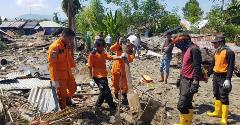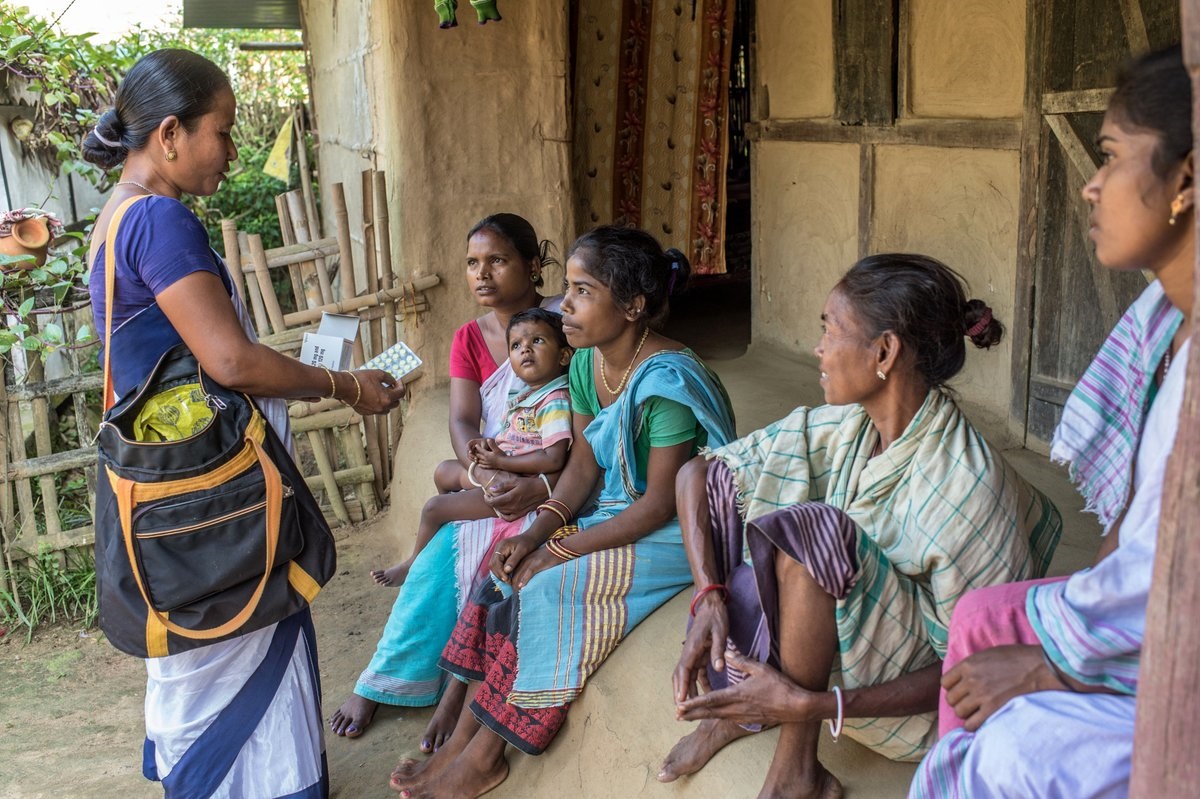Issued on: 17 April 2023
Deadline: 20 May 2023
The South-East Asia Regional Office of World Health Organization (WHO) is seeking experts to serve as members one of the [name of the advisory group]. This “Call for experts” provides information about the advisory group in question, the expert profiles being sought, the process to express interest, and the process of selection.
Background
Tuberculosis (TB) is the world’s top infectious disease killer. In 2021, an estimated 10.6 million people fell ill with TB and 1.6 million died due to the disease globally. The WHO South-East Asia Region carries 26% of the world’s population but the highest burden of TB, accounting annually for 45% of global new TB cases and half the number of deaths. In 2021 an estimated 4.8 million people fell ill with TB and 763 000 died (HIV-negative) across the 11 Member States of the Region. Six of 11 countries in the Region are on the high TB burden country list.
The unprecedented political momentum gained for the global fight against TB provides a unique opportunity to translate policies established within the End TB Strategy 2016-2030 into practice. Regional commitments towards ending TB were made through the Delhi Call for Action during the South-East Asia (SEA) Regional Ministerial meeting held in 2017 and followed up at the Delhi End-TB summit in 2018. Globally, the Moscow Declaration 2017 which emphasized the need for a multisectoral response and accountability framework, followed by the first ever UN General Assembly high level meeting on TB in 2018 added further strength to the commitments and responses to end TB. SEAR has been in the forefront of advocacy to mobilize and drive national commitment on TB. The Regional Director has declared TB as a flagship priority for the Region. WHO SEAR convened a virtual high-level meeting for a renewed response to End TB in the Region, in September 2021. The meeting was co-hosted by India, Indonesia and Nepal and 9 Health Ministers of the Member States participated. This meeting was vital in gaining political commitment to accelerate efforts to end the disease in COVID-19 era.
The South-East Asia Region Strategic and Technical Advisory Group on Tuberculosis in (SEAR STAG-TB) was established in 2021 after an open call for interest, for a duration of two years (1 June 2021 to 31 May 2023) to provide guidance on strategic directions, technical issues and policy formulation for the TB work in the South-East Asia region of WHO. This SEAR STAG-TB also contributes to the development of the Regional Strategic Plan towards ending TB 2021-25.
Functions of the SEAR STAG-TB
In its capacity as an advisory body to WHO, the AG shall have the following functions:
- Advise the WHO Regional Office on adopting - or expanding - a multi-sectoral approach in alignment with the Regional Strategic Plan towards ending TB 2021-2025;
- Advise the WHO Regional Office on advocacy with the Member States to align programme approaches with the vision of universal health coverage through a primary health care approach;
- Advise the the WHO Regional Office in addressing the existing challenges and preparing for the future ones, adapting to the country process of transition in socio-economic conditions, epidemiology of diseases and demographics;
- Recommend innovations required and advise on research needs and new initiatives required in the Region to realize the ambitious goal of ending TB;
- Periodically review the progress in the implementation of the WHO Regional Strategic Plan 2021-25 and progress towards meeting the End TB milestones and targets;
- If requested by the WHO Regional Office, participate in and contribute to the relevant WHO Regional meetings;
- Liaise with other such strategic and technical committees in WHO Regions for information exchange and updates (perhaps: with special attention to the one on UHC and PHC)
Operations of the SEAR STAG-TB
- The AG shall normally meet at least once each year. However, WHO may convene additional meetings. AG meetings may be held in person (at at WHO Regional Office for South-East Asia in New Delhi or another location, as determined by WHO) or virtually, via video or teleconference.
AG meetings may be held in open and/or closed session, as decided by the Chairperson in consultation with WHO.- Open sessions: Open sessions shall be convened for the sole purpose of the exchange of non-confidential information and views and may be attended by Observers (as defined in paragraph III.3 below).
- Closed sessions: The sessions dealing with the formulation of recommendations and/or advice to WHO shall be restricted to the members of the AG and essential WHO Secretariat staff.
- The quorum for AG meetings shall be two thirds of the members.
- WHO may, at its sole discretion, invite external individuals from time to time to attend the open sessions of an advisory group, or parts thereof, as “observers”. Observers may be invited either in their personal capacity, or as representatives from a governmental institution / intergovernmental organization, or from a non-State actor. WHO will request observers invited in their personal capacity to complete a confidentiality undertaking and a declaration of interests form prior to attending a session of the advisory group. Invitations to observers attending as representatives from non-State actors will be subject to WHO internal due diligence and risk assessment including conflict of interest considerations in accordance with the Framework for engagement with non-State actors (FENSA). Observers invited as representatives may also be requested to complete a confidentiality undertaking. Observers shall normally attend meetings of the AG at their own expense and be responsible for making all arrangements in that regard.
At the invitation of the Chairperson, observers may be asked to present their personal views and/or the policies of their organization. Observers will not participate in the process of adopting recommendations of the AG. - The AG may decide to establish smaller working groups (sub-groups of the AG) to work on specific issues. Their deliberations shall take place via teleconference or video-conference. For these sub-groups, no quorum requirement will apply; the outcome of their deliberations will be submitted to the AG for review at one of its meetings.
- AG members are expected to attend meetings. If a member misses two consecutive meetings, WHO may end his/her appointment as a member of the AG.
- Reports of each meeting shall be submitted to Regional Director of WHO (SE Asia Region, through Director, Communicable Disease). All recommendations from the AG are advisory to WHO, who retains full control over any subsequent decisions or actions regarding any proposals, policy issues or other matters considered by the AG.
- The AG shall normally make recommendations by consensus. If, in exceptional circumstances, a consensus on a particular issue cannot be reached, minority opinions will be reflected in the meeting report.
- Active participation is expected from all AG members, including in working groups, teleconferences, and interaction over email. AG members may, in advance of AG meetings, be requested to review meeting materials and to provide their views for consideration by the AG.
- WHO shall determine the modes of communication by the AG, including between WHO and the AG members, and the AG members among themselves.
- AG members shall not speak on behalf of, or represent, the AG or WHO to any third party.
Who can express interest?
The SEAR STAG-TB is a multidisciplinary, with members who have a range of technical knowledge, skills and experience relevant to Tuberculosis. It has 11 existing members with one seat vacant for which this call is being issues.
Accordingly, WHO welcomes expressions of interest from: members of affected communities and civil society organizations, specifically from individuals that have demonstrated experience in promoting ethics, equity, human rights and gender in the are of Tuberculosis
Submitting your expression of interest
To register your interest in being considered for the SEAR STAG-TB, please submit the following documents by 20 May 2023, 23.55 hrs India time to [email protected] using the subject line “Expression of interest for the SEAR STAG-TB"
- A cover letter, indicating your motivation to apply and how you satisfy the selection criteria. Please note that, if selected, membership will be in a personal capacity. Therefore, do not use the letterhead or other identification of your employer;
- Your curriculum vitae (including your nationality/ies) and
- A signed and completed Declaration of Interests (DOI) form for WHO Experts, available at https://www.https://www.who.int/about/ethics/declarations-of-interest.int/about/ethics/declarations-of-interest.
After submission, your expression of interest will be reviewed by a committee constituted by WHO. Due to an expected high volume of interest, only selected individual will be informed.
Important information about the selection processes and conditions of appointment
Members of WHO advisory groups (AGs) must be free of any real, potential or apparent conflicts of interest. To this end, applicants are required to complete the WHO Declaration of Interests for WHO Experts, and the selection as a member of a AG is, amongst other things, dependent on WHO determining that there is no conflict of interest or that any identified conflicts could be appropriately managed (in addition to WHO’s evaluation of an applicant’s experience, expertise and motivation and other criteria).
All AG members will serve in their individual expert capacity and shall not represent any governments, any commercial industries or entities, any research, academic or civil society organizations, or any other bodies, entities, institutions or organizations. They are expected to fully comply with the Code of Conduct for WHO Experts (https://www.who.https://www.who.int/about/ethics/declarations-of-interest). AG members will be expected to sign and return a completed confidentiality undertaking prior to the beginning of the first meeting.
At any point during the selection process, telephone interviews may be scheduled between an applicant and the WHO Secretariat to enable WHO to ask questions relating to the applicant’s experience and expertise and/or to assess whether the applicant meets the criteria for membership in the relevant AG.
The selection of members of the AGs will be made by WHO in its sole discretion, taking into account the following (non-exclusive) criteria: relevant technical expertise; experience in international and country policy work; communication skills; and ability to work constructively with people from different cultural backgrounds and orientations .The selection of AG members will also take account of the need for diverse perspectives from different regions, especially from low and middle-income countries, and for gender balance.
If selected by WHO, proposed members will be sent an invitation letter and a Memorandum of Agreement. Appointment as a member of the AG will be subject to the proposed member returning to WHO the countersigned copy of these two documents.
WHO reserves the right to accept or reject any expression of interest , to annul the open call process and reject all expressions of interest at any time without incurring any liability to the affected applicant or applicants and without any obligation to inform the affected applicant or applicants of the grounds for WHO's action. WHO may also decide, at any time, not to proceed with the establishment of the AG, disband an existing TAG or modify the work of the AG.
WHO shall not in any way be obliged to reveal, or discuss with any applicant, how an expression of interest was assessed, or to provide any other information relating to the evaluation/selection process or to state the reasons for not choosing a member.
WHO may publish the names and a short biography of the selected individuals on the WHO internet.
AG members will not be remunerated for their services in relation to the AG or otherwise. Travel and accommodation expenses of AG members to participate in AG meetings will be covered by WHO in accordance with its applicable policies, rules and procedures.
The appointment will be limited in time as indicated in the letter of appointment.
If you have any questions about this “Call for experts”, please write to Ms Shweta Verma: [email protected], well before the applicable deadline.







